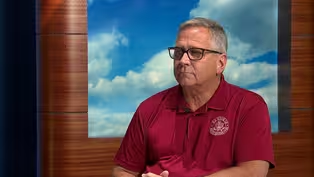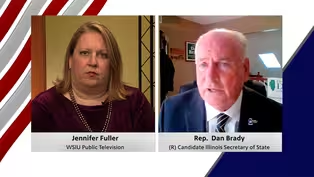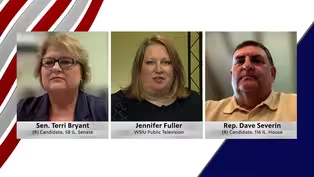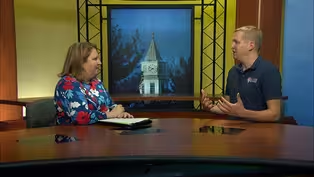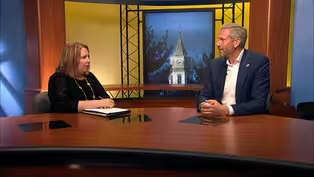Meet the Candidates
115th and 117th IL. House District General Candidate Forum
9/1/2022 | 27m 13sVideo has Closed Captions
115th and 117th IL. House District General Candidate Forum
State Representative Patrick Windhorst (R) running for the 117th Illinois House District and State Representative David Friess (R) running for the 115th Illinois House District discuss the issues facing the southern Illinois region and their plans for tackling them.
Problems playing video? | Closed Captioning Feedback
Problems playing video? | Closed Captioning Feedback
Meet the Candidates is a local public television program presented by WSIU
This series is produced in partnership with the League of Women Voters
Meet the Candidates
115th and 117th IL. House District General Candidate Forum
9/1/2022 | 27m 13sVideo has Closed Captions
State Representative Patrick Windhorst (R) running for the 117th Illinois House District and State Representative David Friess (R) running for the 115th Illinois House District discuss the issues facing the southern Illinois region and their plans for tackling them.
Problems playing video? | Closed Captioning Feedback
How to Watch Meet the Candidates
Meet the Candidates is available to stream on pbs.org and the free PBS App, available on iPhone, Apple TV, Android TV, Android smartphones, Amazon Fire TV, Amazon Fire Tablet, Roku, Samsung Smart TV, and Vizio.
Providing Support for PBS.org
Learn Moreabout PBS online sponsorshipMore from This Collection
Meet the Candidates features interviews with candidates running for Illinois State, House and Senate races. Guests will discuss key issues impacting Illinois voters such as the economy, the environment, education and public health. This series is produced in partnership with the League of Women Voters.
12th U.S. Congressional Seat Rep. Mike Bost
Video has Closed Captions
12th U.S. Congressional Seat Rep. Mike Bost (27m 3s)
12th U.S. Congressional Seat Homer "Chip" Markel
Video has Closed Captions
12th U.S. Congressional Seat Homer "Chip" Markel (27m 14s)
118th Illinois State House, Rep. Paul Jacobs and Van Ikner
Video has Closed Captions
118th Illinois State House, Rep. Paul Jacobs and Van Ikner (25m 16s)
Illinois Governors Race, J.B. Pritzker
Video has Closed Captions
WSIU’s Jennifer Fuller interviews Democratic Governor JB Pritzker. (26m 27s)
Illinois Secretary of State Race Candidate Dan Brady
Video has Closed Captions
Illinois Secretary of State Race Candidate Dan Brady (26m 46s)
58th Senate and 116th House General Election
Video has Closed Captions
State Sen. Terri Bryant (R-Murphysboro) and State Rep. Dave Severin (R-Benton) (27m 2s)
Illinois Treasurer General Election Tom Demmer
Video has Closed Captions
Sit down with Republican State Representative Tom Demmer. (25m 47s)
Illinois Treasurer General Election Michael Frerichs
Video has Closed Captions
Sit down with Democrat Michael Frerichs, who is seeking re-election. (26m 46s)
Providing Support for PBS.org
Learn Moreabout PBS online sponsorship(soothing music) (fast orchestral music) - This is "Meet the Candidates", I'm Steph Whiteside.
Today we are talking with Representative Patrick Windhorst, currently representing the 118th House District and running for the 117th.
And Representative David Friess, who is running for the 115th House seat, currently representing the 116th district.
Both candidates are unopposed on the ballot.
For today's forum, the rules are simple.
Each candidate will have 60 seconds to answer the question, and should not mention their opponent in their response.
Representative Windhorst, Representative Friess, thank you for joining us today.
- Thanks for having us.
- Thank you.
- So both of you have already been representing the Southern Illinois region in the legislature.
What would you consider to be the top issue facing Southern Illinois?
Representative Windhorst, we'll start with you.
- Yes, thank you, I believe the top issue facing Southernmost Illinois is our loss in population.
We have, in the counties I represent, seen a significant loss in population, just in the last 10 years.
And if you go back even several more census takings, then you'll see a even more significant loss.
So that is, that population loss, is being driven by a few factors.
Some of it has to do with Illinois being uncompetitive with surrounding states.
We see a lot of our young people, when they leave for college, not come back, because of lack of opportunity.
And then we see a lot of young families in our area move to Paducah, Kentucky, or Cape Jordan, Missouri, simply because they view it as having a better place to live, or it's a more affordable cost-of-living.
So my goal has been to address that problem, and try to make Illinois competitive with surrounding states, so we'll see people move back to Southern Illinois, and we can thrive as a region.
- Thank you, and Representative Friess?
- Actually, I would just say, ditto to everything Patrick said, and I'll also follow up with an example.
I know a small business, our border... My district borders Missouri, and this individual owns a heating and air company.
And he represented to me, that if he bids a job on this side of the river, he typically gets beat out by competitors just right across the river in Perryville, Missouri.
And the reason he does is because our workers' compensation insurance is so much higher than what they pay in Missouri, that and liability insurance.
You know, there's no shortage of litigation in this state.
So because of those, he frequently loses jobs to somebody across the river.
It's very frustrating, we've gotta be more competitive.
We've gotta keep, not only the businesses that we have here, here in the state, but we've gotta be able and willing to attract new business.
- All right, thank you.
And we will definitely get into some more of that in a couple of questions.
Next up, people often feel that this part of the state can get overlooked in Springfield.
What role does collaboration play in representing Southern Illinois, and how do you work with each other and other lawmakers to help better serve your constituents?
Representative Friess will go... have you go first this time.
- I think there is that feeling that Southern Illinois is frequently overlooked, and I understand why, because just the population.
I was looking some numbers, obviously a large part of the population resides in Chicago Cook County area.
Because of that, they have the numbers that represent their particular constituency, and that demographic is just the way the population works out.
Now, there are instances where we do collaborate.
There are, now, they are few-and-far between, but we do work with members on the other side to try and get some bills passed to benefit our area.
I know I've got some economic development that I would love to get done in our area, and I'm working actually with a downstate Democrat to try and get that accomplished.
- Thank you, and Representative Windhorst.
- Yes, thank you.
First, as it relates to the Representatives in our region in Southern Illinois, we all work together quite well.
We have good relationships, we've built those over time.
And as a region, we tend to have a collective voice going forward in Springfield, where we're able to have 5, 6, 8 of us joining together on certain issues.
But as it relates to working across the aisle, collaboration is key, it's really a delicate balance.
The first thing is we have to make sure we're holding fast to our principles, we're standing up for what we believe in, and that we're a voice for our constituents.
But then we also have to look for areas where we can work together with the other side, where it may not be a fundamental issue of principle, and we can collaborate and work on issues that will move our region forward.
You know, there are some similarities in some of the issues we face in Southern Illinois and Southernmost Illinois, even with the city of Chicago or suburban areas, because they sometimes have a lot of the same issues.
The key is finding those and working together.
- Thank you.
How would you work with lawmakers at the federal level to make sure priorities for this area are prioritized in Washington as well?
Representative Windhorst, we'll go with you again.
- Well, it starts with communication, that communication involves us, as legislators, reaching out with our congressmen and women to build relationships.
So that way, when we pick up the phone to call them, or we wanna meet with them, there's already a preexisting relationship that's there.
And luckily we have those relationships with Congressman Bost, and Congresswoman Miller in Southernmost Illinois, that will bear fruit, or when they're in Washington, D.C.
There is also relationships that are built at the staff level.
So individuals who work in my district office, that district director has built a relationship with the staff of the other offices, and they can deal with issues to help solve problems.
A lot of times those problems have both a potential state and a federal solution.
Sometimes there is talking about infrastructure money for a project, there's a recent infrastructure bill with the federal government, we've had state infrastructure money.
It evolves us having a relationship and working together to achieve those goals.
- Thank you, Representative Friess?
- Again, I'll just ditto to what Patrick said.
I know I consider Mike Bost a friend, and anytime I have any issue I always reach out to him.
He takes my calls, and if it's something that, where I'm busy doing something else, my staff reaches out to his staff.
We work really well together, we really do, particularly on things... VA Benefits, I know that is a huge thing for Congressman Bost, as a former vet, I'm a vet myself.
Any time where we can work together, we typically do, just one of those things.
We're always pulling in the same direction.
- All right, thank you.
So moving on to more of the issues, we'll start with the economy.
A new capital construction plan is bringing millions of dollars to this region for road, bridge, school, and other projects.
Still, there are many areas where things like roads and sewers are in dire need of repair.
What ideas do you have to help update those things?
Representative Friess?
- [David] Update the...
I'm just not sure I followed your question.
- Yes, sorry, updating the infrastructure in the region, particularly things like roads and sewers, where there has been some money coming in recently, but there's still a lot of areas that are in need of improvement.
- Okay, well there's, unfortunately, because those projects are never small-dollar projects.
I mean, they're always really high-ticket items.
A good example is I've got, in my district, Chester, Illinois, we're supposed to, we're slated to get a new bridge within a few years.
They're supposed to break ground, I think, next spring.
Lots of money goes into that end, and Missouri and Illinois, they share that cost, you know, whenever there's a bridge.
Roads, again, another huge, huge, you know, undertaking.
There's a lot of money that goes into that.
Unfortunately, a lot of the local government, when it comes to sewer, and water, and things of that nature, they typically try and fund that themselves, or they try and get grants.
In a lot of the smaller communities, such like where I live in Red Bud and in the smaller towns, they just don't have the funding to do that themselves.
They need to get some more assistance, not only from the local government, but I think also from the federal government as well.
- Thank you, and Representative Windhorst.
- Thank you, I'm gonna echo a lot of what Representative Friess just said.
Those issues, evolving infrastructure roads, is kind of separate from other types of infrastructure, at least in Illinois, because we have the Lockbox constitutional amendment, which protects funds for roads and bridges.
There was the recent increase in the gas tax, I voted against that increase, but that money is in a Lockbox now that's gonna fund road projects throughout the state.
And the Department of Transportation released its recent five-year plan going forward on how that will be spent.
More individual projects, particularly around water and sewer, are often, for our cities and counties in Southernmost Illinois, we're looking to the state and federal government for assistance.
Because as Representative Friess pointed out, we don't typically have the budgets here to fund those on our own.
So one thing that we could do, as a state, is make sure that, of the tax dollars that are already being collected, that the local governments are receiving their fair share of that money, and that they will be able to fund those projects.
- Thank you.
Continuing with the economy, recently there have been announcements regarding new or ongoing economic development projects in the region, like the Cairo Port Project, and the Rend Lake renovations.
Representative Windhorst, starting with you, what other types of projects would you like to see brought into the area?
- Well, tourism is an area that, and that kind of piggybacks on the Rend Lake area, or Rend Lake Project that was just announced.
Tourism is an area, or an industry, which Southernmost Illinois is ready to thrive.
Representatives Severin, who's of course not on this call, is our Republican spokesperson for tourism.
And he likes to point out that we are doing just a very small amount in tourism, we could do much more, and really benefit much more.
So there are some projects, one that's been on the list for quite a while, is a renovation of Fort Massac Park.
And that's an idea and our project.
Making sure that we have our parks in Southernmost Illinois updated and ready to go forward, and make sure the money is there for those projects to move, is important.
That will help us build tourism.
If we, the parks are main driver of that, of the tourism industry in Southernmost Illinois.
Now, we have to become competitive as a state, and that means that we have to have the ability to draw jobs and industry here to help make us competitive.
- Thank you, and we're gonna have more on that in just a minute.
Representative Friess, your response?
- Yeah, I would love to see some money and funds get put towards historical landmarks.
A great example in my district is Pirman Art home, which is probably 30 minutes from where I sit today.
That home has been under severe disrepair for years.
You know, going prior administrations, you know, funding was cut, and now they had bids, they had the job approved.
And with inflation now, the bid's not good anymore, so they've gotta go through the entire process all over again.
And during this whole process, they've got a roof that leaks on this very historical home, and it's just sad, it breaks my heart.
And there has to be a priority put towards these landmarks, 'cause if we don't, we're gonna lose 'em forever for future generations.
And we really, really need to put those resources towards those historical homes or landmarks.
- Thank you.
So you've both alluded to this a little bit, but Illinois has a reputation for being unfriendly for businesses.
What would you do, Representative Friess, to help draw more industry and business to the area?
- I think for starters, unemployment insurance.
My understanding is what we, Patrick can verify this, we've got still unemployment insurance trust fund underfunded by $2.3 billion I think?
My understanding, we had the money to do that, we didn't pay that, that bill's still gonna come due.
So how's that gonna get paid?
That's gonna get paid either by higher insurance, unemployment insurance by employers, that's me, you know, I plan unemployment insurance.
Or by fewer benefits for those that may be injured on a job, or find themselves unemployed.
So we really need to start there next.
It might be good to visit, you know, maybe a litigation reform, you know, liability reform, tort reform.
Those are two things that I think, if we really put some time and effort into, think about the best way to address those issues, if we can come up with some reforms, I think it would really help the business sector.
- Thank you, and Representative Windhorst?
- Yes, just to echo again, some of the things that Representative Friess has said.
The unemployment insurance issue is an immediate concern, and will potentially lead to both an increase in taxes on businesses, and a reduction in benefits on those who need the system.
One area that we hear quite a bit is reform of the workers' compensation system.
There have been some advancements made, we need to continue to work to bring ourselves, as a state, more competitive, to be more competitive with surrounding states.
And then one that's kind of understated, but we're beginning to see, is cost of energy.
Even with Illinois's high taxes and burdensome regulations, which we need to address as well, Illinois had always been competitive with its energy costs, and that is now changing.
Illinois is going from a state that would export energy, to one that's having to import energy, and that's of course causing prices or costs to go up, which is born by businesses.
And that's gonna cause them, if you have to choose to either increase their prices, or costs of... or they're going to have to move as a business.
So those are just a few things that I think would help businesses in our state.
- Thank you.
On a more personal economic level, many Illinoisans are struggling with rising costs for housing, food, and other essentials.
At the same time, social service funds have been depleted due to the COVID-19 pandemic.
What would you do to help people be able to get the help they need?
Representative Windhorst?
- Well, you kind of tied two things together, and I will take, maybe both them in this answer.
First, the rising costs have really hit families at the grocery store and at the pump.
Several Republicans have put together some bills that would address some of the rising costs in fuel that would... You know, Illinois is one of seven states that charges us an additional sales tax on fuel above the gas tax.
There'd be a way to either reduce that or eliminate it during certain times.
As it relates to social services, our state budget, over the last three to four years, has increased payments for social services each year.
Now, of course the social service agencies always need more, they need ways to attract employees.
In fact, that's one of the big issues they're seeing, is trying to keep their wages competitive to have employees.
But I believe as a state, the budget, at least, is moving in that direction to increase payments for social services, that hopefully will eliminate some of those concerns going forward.
- Thank you, Representative Friess?
- Yeah, obviously inflation's huge.
And I don't know what we can do on a state level.
Unfortunately, a lot of this is driven by national politics.
On a social services side, I can tell you this, I have a day job when I'm an attorney, I practice still today, and I see things... We do not have the social services here in Southern Illinois that they have upstate.
So I think one of the things that, we really need to expand our social services downstate.
Mental health treatment, particularly, I know we have a huge drug problem, not only in our state, but across the country.
I see it in my practice daily.
We really need to address that locally, and we need to have social services locally, where people aren't traveling, you know, or an hour, and hour-and-a-half, for those services.
That's one of the things I would love to see happen downstate.
- Thank you.
Another area where families may feel squeezed is property taxes.
What would you do to help ease the burden on homeowners?
Representative Friess, we'll start with you.
- Well, we gotta quit raising property taxes, for starters.
And it just, so where do property taxes go?
A large part of that goes to funding schools.
I know there's been a lot of discussion.
Yeah, you know, I'm a freshman, but ever since I got elected, there's been a lot of discussion about how we're gonna fund our schools, and we need to change the formula and not rely so heavily on property taxes.
That's where I think the first, and most important thing, that we do, is start to figure out how we're gonna fund our schools in a different way than rely so heavily on property taxes.
- Thank you, and Representative Windhorst?
- David's right, education is a primary driver of the property tax bills throughout our state, primarily in Southern Illinois.
As a state, we have established the evidence-based funding model to try to assist what are, termed, Tier I schools, which do not have adequate school funding.
The hope is that by using those evidence-based funding model, which is funded through state funds, rather than property tax funds, that those property tax districts will ultimately be able to reduce property taxes.
That is a long-term solution to a problem that hits every year.
And of course, we talked about out-migration from the very start.
People leaving the state, one of the top reasons is property taxes.
So we need to address property taxes as one of those criteria or problems that is causing people to leave.
And the best way we can do that is to look at the way we're funding schools.
And that will allow school districts to reduce their property tax levy.
- Yeah, do you mind if I add something real quick?
- Go right ahead.
- Yeah, so you understand what we're talking about, is I've got in my district Baldwin Power Plant.
Baldwin Power Plant is slated to shut down at 2025.
Okay, when that does, the local school district is gonna lose, I wish I could remember the percentages, but a large part of its funding from that tax base.
So a school that has been able to thrive to date, is now, when that thing shuts down, is gonna have to look at, how is it gonna fund its school?
And that's the struggle that we're facing.
And that's why I'm saying we really need to revisit how we're funding our schools.
- All right.
Well, another legacy of the pandemic has been an increasing awareness that high-speed internet is critical for school, as we've been talking about schools, and also for people to go to work.
What are you doing to try and help rural areas get access to broadband?
Representative Windhorst, I believe you're up.
- [Patrick] I believe that's right, yes.
Rural broadband is vital to Southern Illinois.
That is a way we can bring ourselves into parity with the rest of the state.
If we can achieve more connectivity, we'll be able to attract businesses and people to our area.
And broadband is becoming a utility, just like water, and sewer, and electricity is, so we have to have that, it's fundamental.
One of the issues I see is that there is efforts by both the federal government and the state government to address broadband access, but it is really a piecemeal approach.
There are are grants that are put out there, their application processes that are achieved, and then there'll be a certain portion of a county or a city that receives broadband access.
What I would like to see happen is a more cumulative, or total approach, to achieve that broadband access so that way it's not piecemeal.
The other thing that we have to do is there's really not a good coverage map to show where there is coverage, and where there is not in the state.
One of the things I'm pushing for is the state to have a map that demonstrates where the coverage exists.
- Well, thank you, and Representative Friess?
- No, it's a huge problem.
I saw it in the school district where my kids attend school.
It was during the lockdown, and everybody was attending class via Zoom.
I know parents had actually drove to town, or to the library, so they would have internet access so the kids could do the schoolwork.
And I've been to their house, they didn't even live that far out of town, which absolutely stunned me.
So Patrick's right, we've gotta have, if you wanna call it a broad approach, a master plan, we've gotta attack this, because it is a utility now that everybody needs to have, be it just like water and power, we need it.
Especially given the fact that a lot of kids, they check in, even absent COVID, you know?
They have to do stuff online.
So we really need to make sure that we have a broader approach to tackling this so everybody in this state has broadband.
- Thank you, and this is going to be our last question.
Speaking of the pandemic, it may not be on the front-of-mind for people anymore, but it also isn't entirely over, and now we're seeing the appearance of monkeypox.
What will you do to make sure Illinois is able to address public health emergencies that may arise in the future?
Representative Friess?
- [David] Oh, what am I gonna do?
First of all, I would love to see these type of instances or situations not become political in nature.
And that's unfortunately what happened with COVID, it really did.
It became political, and then no one listening to everybody, everybody was shouting across each other, and no one heard what anybody else was saying.
If we can get the politics out of it, and we can rely on the true science of it... And here's it, politicians need to learn to say, "You know what, I don't know," instead of trying to provide an answer to every question, just be honest with us.
And say, "You know what, I don't know about this, I don't know about that."
And I think that will go a long way, as opposed to trying to provide an answer to appease either a section of the population, or somebody, and then that answer not being correct.
- Thank you, and Representative Windhorst?
- That was a great answer, Dave, I'd almost just like to repeat it and say "ditto."
But I will adjust a little bit to that, as we try to put the politics aside.
And admit, have the humility to admit when we don't know something, which is, I think, what got us in trouble, at least with the politicization of it.
We need to make sure that our local health departments have the resources they need.
You know, we have the state IDBH that was overseeing the pandemic.
But what I saw locally was that there was different responses in different health departments, locally, based on the resources they had.
So we have to make sure that, in some of the more rural areas, some of the areas with higher poverty, that those public health departments have the resources to help address it locally.
And that way we can address it, like we should, as a state, and every citizen has an adequate response given to them.
- Well, thank you.
And thank you both so much for joining us today.
- Thank you.
- Thanks for having us.
- And thank all of you for watching.
This has been "Meet the Candidates" on WSIU, with Representative Patrick Windhorst running for the 117th District, and Representative David Friess running for the 115th.
Tune in again next week for more campaign forums.
For WSIU, I'm Steph Whiteside.
(fast orchestral music)

- News and Public Affairs

Top journalists deliver compelling original analysis of the hour's headlines.

- News and Public Affairs

FRONTLINE is investigative journalism that questions, explains and changes our world.












Support for PBS provided by:
Meet the Candidates is a local public television program presented by WSIU
This series is produced in partnership with the League of Women Voters

